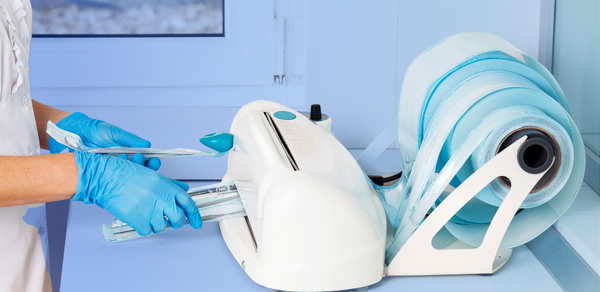Sterile Processing Technician
Become a Sterile Processing Technician
Sterile Processing Technician (SPT), also known as Central Service Technicians, play a critical role in preventing infection by sterilizing, cleaning, processing, assembling, storing, and distributing medical supplies. This online sterile processing technician certification course will train you to work as an SPT and prepares you for the Certified Registered Central Service Technician (CRCST) certification offered by the Healthcare Sterile Processing Association (HSPA). This course also includes a voucher which is prepaid access to sit for the certification exam upon eligibility.
Career FAQs
- Define the sterile processor role, responsibilities, professional skill set, and communication expectations (including accurate use of medical terminology and anatomy) required in the central processing and surgical services departments
- Identify sterile processing regulations and standards provided by regulatory agencies and professional associations to ensure workplace safety, infection prevention, and proper support for the ancillary departments
- Discuss basic procedures and best practices for each phase of sterile processing, including decontamination, inspection, preparation, and sterilization of medical instruments and supplies
- Discuss sterile storage considerations, guidelines, concerns, and common quality assurance procedures in the sterile processing department
- Discuss the importance of following procedures to care for loaner instruments and manage inventory while using information management systems
- Describe how to adhere to compliance when handling documentation and maintaining records
- Explain the importance of effective communication, human relations, and personal development and how improving these skills can impact the career of a sterile processing technician
Prerequisites and Requirements
In order to sit for the national certification exam, candidates must have a high school diploma or equivalent; it is recommended that you have this before enrolling in this program.
Curriculum
- Medical Terminology
- Introduction to Medical Terminology
- The Musculoskeletal System
- The Cardiovascular System
- The Lymphatic and Immune Systems
- The Respiratory System
- The Digestive System
- The Urinary System
- The Nervous System
- The Special Senses The Eyes and Ears
- The Integumentary System
- The Endocrine System
- The Reproductive System
- Diagnostic Procedures, Nuclear Medicine, Pharmacology
- Sterile Processing Technician
- Introduction
- Infection Control, Standards, and Regulations
- Decontamination and Workplace Safety
- Disinfection Process and Complex Instrumentation
- Tray Assembly
- Prep and Pack
- Introduction to Sterilization
- Introduction to Low-Temperature Sterilization
- Instrumentation Identification (Part 1)
- Instrumentation Identification (Part 2)
- Case Cart Introduction
- Sterile Storage
- Managing Inventory
- Ancillary Department Support
- Important Components for a Successful Career
- Wrapping Up and Preparing for Your Exam
Instructors
Janice Brownlee
Janice "Jan" Brownlee has been a Certified Surgical Technologist (CST) for 43 years and has worked in all sizes of hospitals, including surgery centers. Jan worked in a sterile processing department in the instrument room and sterile supply areas. While working in the operating room, she scrubbed all services, with cardiothoracic, vascular, and orthopedics being her favorites.
Jan also had the opportunity to work for a private group of cardiothoracic surgeons and expand her knowledge and skills even more. Working as a surgical first assistant was the highlight of her career. She has continued her career path by teaching surgical technology and sterile processing at a local community college and enjoys watching her students learn and grow.
Career FAQs
HOW MUCH DOES A STERILE PROCESSING TECHNICIAN MAKE?
As of December 14, 2022, there are 44,190 active job postings for sterile processing technicians, with a projected growth rate of 6.3% over the next 10 years for this profession. The median sterile processing technician salary is $34,199.
WHAT IS A STERILE PROCESSING TECHNICIAN?
According to Indeed.com, a sterile processing technician (SPT) plays an important role in indirectly providing patient care. They carefully prepare, install, assemble, clean, and sterilize all the health care and laboratory equipment used in medical exams, surgeries, and other clinical procedures. They also ensure strict adherence to sterilization processes and that instruments, equipment, and supplies are safe for reuse across patients daily.
An SPT plays an integral role in ensuring the success of surgeries. Sterile processing technicians usually work in clinics, hospitals, doctor's offices, and other settings that use medical equipment.
WHAT DOES A STERILE PROCESSING TECHNICIAN DO?
According to Indeed.com, a sterile processing technician (SPT) regularly performs several duties, including:
- Preparing and delivering clean and sterilized instruments and equipment necessary for medical examinations, surgeries, medical carts, and clinical procedures
- Sterilizing, wrapping, organizing, and preparing medical equipment and surgical instruments into instrument trays for use during clinical procedures
- Laying out surgical gloves and gowns before each medical procedure
- Collecting and manually cleaning used and contaminated medical equipment, supplies, and instruments for sorting and decontamination
- Preparing and packing decontaminated medical tools and supplies for sterilization
- Operating and monitoring sterilization equipment
- Examining supplies meticulously to ensure their cleanliness
- Checking and reporting any problems or issues with the sterilization equipment to surgeons or supervisors and requesting replacements
- Maintaining records of sterilization procedures, equipment maintenance, sterilized items and supplies
- Reordering medical and surgical supplies, controlling the inventory, and checking the expiration dates of products
- Removing medical waste and disposing of them appropriately
ZipRecruiter also notes that SPTs use specialized equipment, such as an autoclave, to ensure that all surgical instruments and materials are sterile and safe for the patient. They review inventory and assess equipment and materials to prepare the surgical suite for each procedure.

